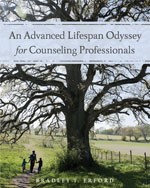COURSE REQUIRED TEXTBOOK AND READINGS
Required Texts

Erford, B. T. (2017). An advanced lifespan odyssey for counseling professionals. Boston, MA: Cengage Learning. ISBN 13: 978-1-305-85756-8
Recommended Texts
Karen, R. (1994). Becoming attached. New York: Warner Books.
COURSE DESCRIPTION
3 credit hours. This course examines the nature of the developmental process, from birth to death. The course will look at biological, psychological, and sociological aspects of development. The course will review developmental theories in each area and the educational needs of individuals at different points of their lives. Core (CSR, B)
COURSE OBJECTIVES
Objectives from 2016 CACREP standards that are directly tied to programmatic student learning objectives:
By the end of the course, students will be expected to demonstrate their understanding of the following learning outcomes:
Social and Cultural Diversity (2016 CACREP 2.F.2)
d. the impact of heritage, attitudes, beliefs, understandings, and acculturative experiences on an individual's views of others
Human Growth and Development (2016 CACREP 2.F.3)
a. theories of individual and family development across the lifespan
b. theories of learning
c. theories of normal and abnormal personality development
e. biological, neurological, and physiological factors that affect human development, functioning, and behavior
f. systematic and environmental factors that affect human development, functioning, and behavior
g. effects of crisis, disasters, and trauma on diverse individuals across the lifespan
h. a general framework for understanding differing abilities and strategies for differentiated interventions
i. ethical and culturally relevant strategies for promoting resilience and optimum development and wellness across the lifespan
Assessment and Testing (2016 CACREP 2.F.7)
e. use of assessments for diagnostic and intervention planning purposes
Clinical Mental Health Counseling Foundations (2016 CACREP 5.C.1)
e. psychological tests and assessments specific to clinical mental health counseling
Clinical Mental Health Counseling Contextual Dimensions (2016 CACREP 5.C.2)
f. impact of crisis and trauma on individuals with mental health diagnoses
g. impact of biological and neurological mechanisms on mental health
Clinical Mental Health Counseling Practice (2016 CACREP 5.C.3)
b. techniques and interventions for prevention and treatment of a broad range of mental health issues
Objectives from 2016 CACREP standards that are NOT directly tied to programmatic student learning objectives:
None
Objectives not from CACREP standards:
Upon successful completion of the course, each student will:
1. understand the basic characteristics of development.
2. be aware of prominent debates about the nature of development.
3. understand human development theories that explain cognitive and intellectual development, humanistic perspectives, morality, faith, and others.
4. understand major biological, psychological, and social milestones, differences, and realities during the following stages of life: prenatal, infancy, toddlerhood, preschool years, middle childhood, adolescence, young adulthood, middle adulthood, later adulthood, and old age.